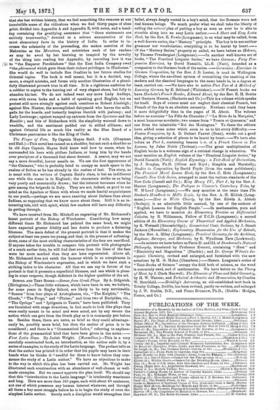Robert Ainsleigh. By the Author of "Lady Audley's Secret." (MaxweN
and Co.)—This is a reprint of a novel by Miss Braddon which appeared some years ago in the Belgravia Magazine. There does not appear to be any special reason for its reappearance, except that in the first instance it was published anonymously, and the author wishes, naturally enough, to get credit for her first attempt at a novel with any more recondite associations than French plays and English police-courts- The attempt is in itself praiseworthy, but it is so ill carried out that the credit to be derived from it must rest there. Miss.
Braddon's mock eighteenth-century dialogue is as flimsily pretentious and unreal, as her habitual classical and mythological metaphors.
and allusions are blundering. She is not more at home with Addison than she is with Suetonius, about whom she made such a funny mistake lately. The English portion of Robert Ainsleigh 'e
history is a queer compound of sensationalism and sententiousness, which are antagonistic qualities, with little scraps of adaptation from memoirs and papers of the day, and the weakest possible
flavour of would-be realism, such as the use of the words " bath," and "mistress," and occasional side-references to "Mr." Garrick, "Mr." Johnson, "Mr." Steele, and such like cheap piixes de circon- stance. Robert Ainsleigh, a young gentleman of incomparable
virtue and vapidness, in fact a bore of the first magnitude, goes to India under certain painful circumstances, and becomes a specs
tator of certain famous events, well known to all ordinary readers of Anglo-Indian history, and brilliantly related in the form of fiction by Colonel Meadows Taylor in his "Ralph Darnell," but which Miss-
Braddon, in all the pardonable enthusiasm of working on entirely new lines, evidently supposes to be rare, recondite, and attainable only by profound research. Hence, not only one of the dullest conceivable stories, full of dry detail of the early years of the reign of "John Company," without a particle of local colour, and written with tame and gingerly caution, betraying the terra incognita, both positive and relative, at every step, but an appendix, which is the only laughable thing in the book. Miss Braddon is so sincere, so ingenuous in her conviction that she has written history, that we feel something like remorse at our irresistible sense of the ridiculous when we find thirty pages of close print, divided into Appendix A and Appendix B, with notes, and a head- ing containing the gratifying assurance that "these statements are entirely trustworthy," devoted to a solemn enumeration of the most elementary facts in the history of India. In order to in- crease the solemnity of the proceeding, she makes mention of the Mahrattas as the Morattoes, and astonishes such of her readers as may be awed by her learning or tempted by the novelty of the thing into reading her Appendix, by recording how it was (if to "the Emperor Ferokhshere " that the East India Company owed "the phirmaund which gave them their richest privileges in Hindostan." She would do well to include Bon Gushier in her future studies for Oriental topics. The book is well meant, but it is a decided, nay, more, a stupid mistake, and forms only another illustration of a plenti- fully illustrated proverb true in all time. It is a righteous ambition for a cobbler to aspire to the taming out of very elegant shoes, but folly to abandon his last. We do not indeed want any more Lady Audleys, even with raven locks and a habit of speaking good English, but we protest still more strongly against such creations as Robert Ainsleigh ; against Mrs. Hunter, the accomplished dairymaid who leaves the milk- pails for the boards, and instantly inspires Garrick with jealousy; and Lady Lestrange ; against vamped-up extracts from the Spectator and the Rambler ; and bite of Richardson with the simplicity watered down to twaddle, and the sentiment padded out to stilted silliness; and against Oriental life as much like reality as the Blue Beard of a Christmas pantomime is like the King of Onde.



































 Previous page
Previous page